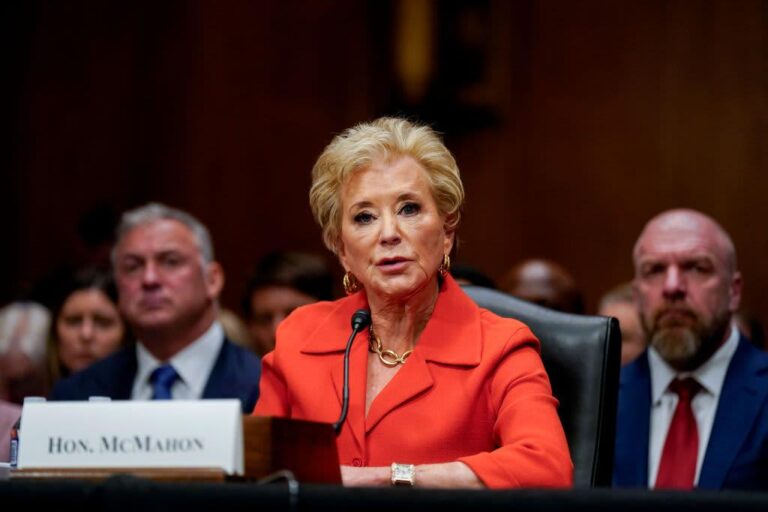Linda McMahon’s Confirmation Hearing Highlights Critical Challenges in U.S. Education Policy
Intense Examination of Pandemic Recovery Efforts at Education Department
During Linda McMahon’s confirmation hearing, senators rigorously questioned her preparedness to tackle the ongoing repercussions of the COVID-19 pandemic on the nation’s education system. Lawmakers voiced significant dissatisfaction with the Department of Education’s delayed distribution of essential funds and resources to schools across the country. Additionally, inconsistent communication with state and local education authorities was criticized, revealing systemic obstacles that have hindered effective pandemic recovery.
Key topics of concern included:
- Management and oversight of American Rescue Plan (ARP) funding, particularly its effectiveness in supporting underfunded school districts.
- Proposed initiatives to mitigate learning loss and address the mental health challenges intensified by extended remote learning periods.
- Efforts to improve equity and accessibility for marginalized student groups moving forward.
| Focus Area | Congressional Concerns | Suggested Oversight Measures |
|---|---|---|
| Funding Allocation | Delays and lack of transparency | Implementation of real-time fund tracking systems |
| Student Support Services | Effectiveness of intervention programs | Expansion of mental health counseling and support |
| Educational Equity | Widening access disparities | Targeted distribution of resources to vulnerable populations |
Persistent Inequities in Public School Funding Under Scrutiny
Lawmakers raised pressing questions about the ongoing inequities in public school financing, challenging whether the Department of Education, under McMahon’s prospective leadership, is adequately addressing these systemic disparities. Despite an overall increase in education budgets, many districts serving predominantly low-income and minority students continue to grapple with insufficient resources. Advocates called for reforming funding formulas to prioritize student need over local wealth, emphasizing that increased spending alone does not guarantee equal educational opportunities.
- Disparities in per-student funding: Some districts receive substantially less funding than affluent counterparts despite similar or greater needs.
- Transparency issues: Concerns about the clarity and accountability in how funds are allocated and reported.
- Inadequate support for special education: Federal aid intended for special education programs often fails to reach its target effectively.
| District Type | Average Spending Per Student | Percentage of Federal Aid |
|---|---|---|
| Urban Low-Income | $9,500 | 47% |
| Affluent Suburban | $15,200 | 14% |
| Rural Moderate-Income | $8,300 | 37% |
Complicating these challenges, testimony revealed that bureaucratic inefficiencies and overlapping federal programs often delay the timely delivery of funds. Senators pressed McMahon on her plans to streamline aid distribution and enhance oversight to ensure that financial resources effectively support educational equity. The debate also touched on the balance of responsibility between federal, state, and local governments in guaranteeing fair access to quality education, with some advocating for a comprehensive overhaul of funding mechanisms to close long-standing opportunity gaps.
Demand for Enhanced Accountability in Education Administration
Throughout the hearing, legislators emphasized the urgent need for stronger accountability frameworks within the Department of Education’s leadership. Several members of Congress criticized recent decisions that appeared to lack sufficient oversight, underscoring the necessity for transparent governance to rebuild public confidence. The discussion highlighted shortcomings in addressing equity, managing funds, and implementing policies, all of which have impeded meaningful progress in education reform.
Highlighted concerns included:
- Uneven enforcement of civil rights protections in educational institutions
- Slow responses to escalating student mental health issues
- Opaque reporting on the use of federal education funds
- Limited collaboration with local education stakeholders
The table below summarizes recent accountability performance indicators reported by the Department of Education:
| Accountability Metric | 2023 Performance | 2025 Goal |
|---|---|---|
| Completion of Compliance Audits | 62% | 90% |
| Timeliness in Addressing Complaints | 54% | 85% |
| Allocation of Equity Initiative Funds | 74% | 95% |
Advocates warn that without reinforced accountability measures, systemic issues will persist, undermining efforts to improve educational outcomes. The hearing underscored a growing consensus for policies that emphasize not only enforcement but also proactive transparency and meaningful community engagement.
Calls for Comprehensive Policy Reforms to Combat Learning Loss and Bridge the Digital Divide
Education experts testifying at the hearing stressed the critical need for comprehensive reforms to address the significant learning setbacks caused by extended school closures. They warned that without focused interventions, students from disadvantaged backgrounds risk falling further behind, exacerbating existing educational inequities. Recommendations included increased investment in remedial education, expanded tutoring initiatives, and the adoption of adaptive learning technologies tailored to diverse student needs.
Addressing the digital divide emerged as a central theme, as the pandemic exposed glaring disparities in access to reliable internet and technology. Panelists advocated for:
- Federal programs aimed at expanding affordable broadband access in rural and underserved urban communities,
- Funding grants to equip schools with modern digital learning tools,
- Professional development opportunities to train educators in effective technology integration.
| Policy Area | Recommended Action | Anticipated Impact |
|---|---|---|
| Learning Recovery | Expand summer and after-school academic programs | Accelerated student progress and skill recovery |
| Digital Equity | Invest in nationwide broadband infrastructure | Improved access to digital learning resources |
| Teacher Training | Enhance digital literacy and instructional technology workshops | Higher quality remote and hybrid teaching |
Conclusion: Leadership and Policy Direction Under the Microscope
As Linda McMahon’s confirmation hearing drew to a close, it became evident that the scrutiny extended well beyond her personal qualifications, focusing instead on the broader challenges confronting the U.S. Department of Education. Lawmakers seized the opportunity to hold the agency accountable for its past actions and to debate the future trajectory of national education policy. With the Senate’s final decision pending, the hearing highlighted the critical importance of effective leadership in navigating the complex political and social factors shaping American education today.







